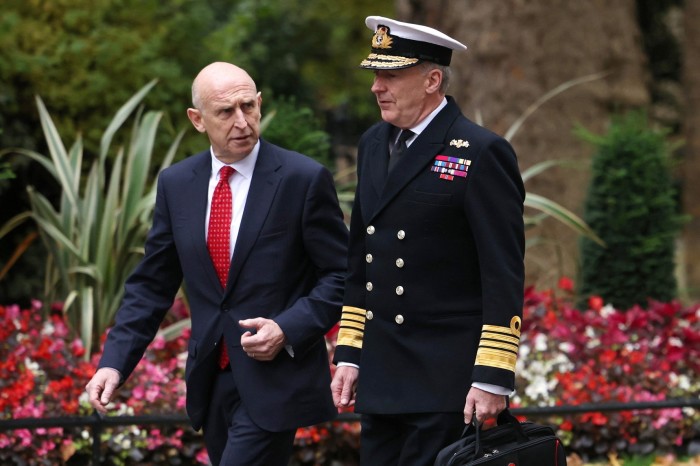Early in our lunch I ask the sinologist Li Cheng what comes to his mind when he closes his eyes and returns to the Cultural Revolution. The answer snaps back at me: “Violence.”
Li was born in 1956, the youngest of seven children in a wealthy Shanghai family — a deadly place to be during Mao’s murderous social cleansing campaign.
So it was for his eldest brother — on whom the younger children had climbed about like monkeys. The brother, the family was initially told, took his own life, a smashed wristwatch given as proof that he had thrown himself under a train. Later, they discovered he had been beaten to death by Red Guards, his body discarded on the tracks.
Today Li is among the pre-eminent scholars of elite Chinese politics and a long-serving bridge between Washington and Beijing. He spent much of the past four decades in the US, including 17 years at the Brookings Institution, a leading think-tank, steering western officials and China-watchers through the murky labyrinth of the Chinese Communist party.
We are meeting at the China Club, on the 13th floor of the Old Bank of China building in downtown Hong Kong. Though the restaurant’s more discreet side room is empty of other guests, it still feels crowded thanks to the cornucopia of decorative antiques, stylings of colonial Shanghai and Hong Kong synonymous with the club’s late founder (and FT columnist) David Wing-cheung Tang.
I almost cry when I think about my wonderful treatment [in America] . . . now it is completely different
From our small window-side table we look across Victoria Harbour towards Kowloon, and beyond that the Chinese mainland. As we sip white peony tea out of small porcelain cups, Li leans forward and explains how he has ended up here, in something of self-imposed exile from Washington.
Sickly in his youth, Li was spared hard labour in the countryside. After schooling, he worked as a physician, poorly trained and ill-equipped, before learning English in his early twenties. In 1985 he got his ticket out of China, helped by a sister who had moved to America.
Li’s early academic life in America — Berkeley, then Princeton — coincided with halcyon days of China studies in the US and Deng Xiaoping’s opening of the Communist-led country to the world. “I almost cry when I think about my wonderful treatment . . . now it is completely different,” he says.
He made his mark with a series of stunningly accurate predictions of the composition of the Chinese Communist party politburo and its standing committee — the country’s top leadership groups. He fell into the close orbit of Henry Kissinger, the US statesman who opened ties with China. He advised presidential campaigns. He taught, and wrote books.
But a few years ago, Li began telling friends in Washington of his intention to leave. Despite America’s glaring — and increasing — need for knowledge of China as the country rises to become one of the world’s true superpowers, the role Li had carved out for himself in the US, as a bridge to promote understanding, had become “very limited”.
Looking back, he says attitudes towards China had been darkening for years — “much earlier” than most people realise.
Around 2015, towards the end of Barack Obama’s second term and in the early years of the rule of Xi Jinping, Li’s mentor and boss at Brookings, the late Jeffrey Bader, came to him with a warning: “He said, we are no longer the mainstream centre of China studies, we will be marginalised. The reason is so many people started to fear China, and they will shift the policy, largely driven not by rational [thinking] but by ungrounded fear.”
Today, Li says bluntly, “America is not in the mood to study China.” But there is a deeper pessimism over changes he has witnessed. “Economics has become mathematics. Political science has become statistics. There’s no appreciation for history, or culture. That mindset, do you think that serves US interests?”
In his late sixties, Li is both trim and animated, with an unflinching gaze. Adding to an aura of youthful energy is a cheerful disposition, a short crop of improbably jet-black hair and the enigmatic, ageless complexion of a man who keeps in good health.
We briefly discuss the menu, settling on the duck and dim sum the restaurant is known for. And we agree with our gruff though good-natured waiter that a whole bird is unnecessary, half will be more than enough.
I want to know if Li was personally attacked in Washington.
At first he dances around the question. He talks of how in the “revolving door” between government and business in the US there is a long tradition of former officials, and their families, “directly or indirectly” doing business with China. And yet, he says, it is the Chinese-Americans, including Elaine Chao, the former transportation secretary, who are most often “singled out” for criticism.
Ultimately, he says, there were personal attacks. “When I say ‘we’, people increasingly ask me, ‘What do you mean by we?’ . . . It is a direct challenge, because of your race, your name.”
Li goes on. “I explained my theories of Chinese leadership. I was branded as a spokesperson for China,” he says. “It is sad. The old days of China, the time I grew up, the pendulum swings back.”
Is he saying that the persecution that took place in Maoist China has parallels with the racial attacks he has seen in America? He clarifies: “It is not the same. It is different. But some components are similar, some methods, some intentions . . . McCarthyism, it is not uniquely American.”
Menu
The China Club
13-14/F, Old Bank of China Building, Bank Street Central, Hong Kong
Har gau (shrimp dumplings with bamboo shoot) HK$46
Xiaolongbao (Shanghai-style steamed minced meat buns) HK$46
Steamed vegetable dumplings HK$46
Half roast Peking duck HK$310
White peony king tea HK$96
Iced coffee HK$75
Total inc tax and service HK$681 (£67.60)
Six dumplings have arrived and a glorious fragrance rises from the table. We pause to eat. The first two offerings, one vegetable and one har gau of shrimp and bamboo shoot, are unremarkable. But for me the test of any good dim sum is the xiaolongbao, the king of soup dumplings. This one is superb, well balanced and moreish, with its delicate skin housing a hot, aromatic soup and pork mince. I regret not ordering more.
Since the days of Mao, westerners have tried, usually without success, to understand the inner workings of the Chinese Communist party, the thoughts of its leader and, around him, whose influence is rising, whose is falling.
Li’s innovation has been a razor-sharp focus on the upbringing, personal networks and lines of loyalty among those at the very top. This approach led to the grouping of leaders, including the taizidang, or “princelings”, who were children of the party’s elders and revolutionary leaders; the tuanpai, or Communist Youth League faction; and the Shanghai bang, or clique, of leaders who owed their advancement to Jiang Zemin, with whom they had worked in China’s business capital in the 1980s.
Impenetrable to most foreigners, China’s system is, for Li, “not so opaque”. To make his predictions, he says, he coupled his theories of factional politics with his “obsession” with the institutional rules and precedents of the party, including the age requirements for retirement and term limits. “You will very quickly find out who the rising stars are.”
Human rights — how can you persuade Chinese people when they see what is happening around the world? . . . Unfortunately, we do not live in a liberal era
Such study is extremely dangerous in China, so the US was for years a refuge for Li. He became an American citizen in 2003. I’m wondering how Li’s public voice might be compromised now that he is working in Hong Kong. Critics say the city’s academic independence, along with other democratic freedoms, has been eroded.
The “irony”, Li says, is that just a year after opening a new China-focused institute at the University of Hong Kong, he is already “much busier” and feels less pressure to self-censor than in DC.
We are interrupted briefly as our waiter appears at my shoulder to present “the duck” like a bottle of wine. It is then returned to the kitchen to be sliced for our pancakes. I change tack from Hong Kong, and start asking about Xi Jinping.
Li says he first became aware of Xi in the early 1990s. He had returned to China to research the rise of technocrats in the Chinese leadership, focusing on Beijing’s elite Tsinghua university, where Xi had studied in the late 1970s. He has since met Xi on several occasions and still has access to Beijing insiders.
I ask whether Li underestimated Xi, his ruthless manoeuvring to crush rivals and ascend to the top of the party. He nods in agreement. But he notes that by 2012 — when Xi became general secretary of the party and head of the military — there were no illusions: “You can say [manoeuvring]. I say it is a political operation, so effective, so strategic.”
Our Beijing kaoya has arrived and as Li speaks we go about our work with chopsticks. I am haphazard with my pancakes. Li is meticulous. He adds a spoonful of the plum-brown fermented sauce before building a neat stack of duck slices, strips of cucumber and spring onion. Either way, they are delicious: the duck breast is tender, not fatty, the skin is crispy, not chewy. There is a reason the dish has survived since the 13th century.
We delve deeper into the psychology of Xi. The 71-year-old, who is now considered China’s most powerful leader since Mao, shattered the post-Deng precedent of two five-year terms for the party’s leader, bulldozed the once-dominant factions and stacked key positions with his loyalists.
Xi, according to many foreign critics, is personally responsible for China’s regression into authoritarianism, crackdowns on freedoms of speech and association, mass electronic surveillance and repression of minorities, as well as military assertiveness over Taiwan and the South China Sea and a destabilising friendship with Russia’s Vladimir Putin, among other faults.
Of course there are principles, there is justice. But sometimes things should not be ideological, should not be binary thinking
Li says Xi is driven by three key beliefs which may not be well understood in the west. Xi’s greatest fear, Li says, is repeating the mistakes of Mikhail Gorbachev, the last leader of the Soviet Union; he worries, above all, of a “slow marginalisation” of the party. He has a deeply rooted view that the “terrible” political and social divisions in countries such as the US and France are due to economic disparity. And he believes that the east — China — is on the rise and the west — the US — is in decline.
Li insists he is clear-eyed about Xi’s unpopularity among some key sections in Chinese society: liberal intellectuals, wealthy entrepreneurs and some middle- and low-level officials.
But Li attempts to place Xi in the context of his times. “It is easy to blame everything on him,” he says. He points out that Xi took over after about two decades of so-called collective leadership. The factions, warring behind the scenes, provided a force of checks and balances. Yet corruption was rife, and the party was crippled by infighting, culminating with the operatic downfall of Bo Xilai, the former party chief of Chongqing.
“That system, Edward, was not perfect,” he says. “The narrative [in China] is: Mao made China stand up, Deng made China rich, Xi made China strong . . . That narrative is not necessarily wrong.”
The “reality”, which those at the top of the political establishment in China understand, is far removed from western perceptions, Li says. “I think he saved the Chinese Communist party.”
We are down to the final few slices of duck. The restaurant is busier with business lunches. Fearful of losing even a syllable, I slide my voice recorder closer to Li’s side of the table.
Xi Jinping cannot live for ever. The question is whether he, like Deng and Mao, will rule China until death. Li predicts Xi will have another five-year term in power — potentially extending his leadership to 2032, at which point he would be 79. But he says that Xi’s preparations for succession are already under way.
Xi’s plan, Li believes, should become clearer as he starts his fourth term, in 2027. “Things will change. There is a reason that he justified his continuation [into a third term], you may not agree, but the establishment accepted. But it does not give [him] an open cheque for ‘president for ever’. The people surrounding Xi are loyalists, but the degree of loyalty is different,” he adds.
Our plates are cleared. I order a coffee, Li sticks to tea. It is high time to make the counter-argument. I run through a long list of grievances against Xi.
On the one hand, Li stresses he is personally “a liberal” and a friend of the Dalai Lama. Some of the crackdowns, he says, have been “really excessive, a mistake”. But on the other, he points to the odious use of the security apparatus by earlier Chinese leaders. And when I ask about repression and mass detentions of Uyghurs and other Muslim groups in Xinjiang, he questions the US government’s official description of the events as genocide.
“Human rights — how can you persuade Chinese people when they see what is happening around the world? . . . Unfortunately, we do not live in a liberal era.”
Li leaves several thoughts unfinished. I sense that we have arrived at his own personal predicament. As debate over China becomes increasingly bereft of nuance, Li is nervous that any criticism he directs at either side will be taken out of context and used as “ammunition” by hawks in Washington.
“For me, the worst thing is to ask me to take a position. Of course there are principles, there is justice. But sometimes things should not be ideological, should not be binary thinking.”
“Empathy”, he says, “is so crucial at this point.”
Worsening US-China relations appear to be only exacerbating military tensions. The flashpoints of Taiwan — which China claims as its own and has not ruled out using force to control — and the disputed South China Sea are both worrying Li.
He is unsparing in his criticism of those in Washington — a group that includes Republican senators — who seem to advocate the pursuit of regime change in Beijing. And he believes the US election offers little optimism for improving relations between the two sides.
Kamala Harris has scant China experience and appears set to follow Joe Biden’s approach of coalition building, isolating Beijing. Donald Trump is more domestic-orientated but unpredictable. “So really both are bad . . . I don’t think China has a preference.
“We’re entering a period that is very, very dangerous . . . The stakes are so high. There would be no winners.”
Two fortune cookies sit unopened between us.
The conversation returns to Li’s childhood home in the heart of Shanghai’s leafy former French concession. I comment that he has had a remarkable life so far, working in one of the most interesting fields I can think of. And yet, I venture, there is something tragic about seeing him here in Hong Kong. He nods again and tells a quick story.
About 10 years ago, he found himself at the hospital where he worked before emigrating to the US. He saw a security guard who had been there at the time. As they recognised each other, and exchanged pleasantries, Li thought to himself: “I wonder which one, he or I, had a more enjoyable life? Who could judge?”
Edward White is the FT’s China correspondent
Find out about our latest stories first — follow FT Weekend on Instagram and X, and subscribe to our podcast Life & Art wherever you listen
















































































































































































You must be logged in to post a comment Login